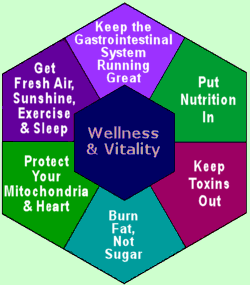|

|
Health Foundation # 2:
Put Nutrition In
Eating a wide variety of nutrient-dense food is the best way to ensure that the cellular repair tools need in the body are available.
Nutrients are the building blocks for maintaining cellular integrity. Nutrient dense foods means mineral, vitamin, phytonutrient and oil rich foods that are prepared in ways that don’t damage the nutrients and don’t introduce toxifying elements into the body.
|
|
|
|
We Are What We Eat
Paradoxically, food is essential to life, but the seeds of our death are in the daily food we eat (or don’t eat). We need to choose wisely what we put into our mouths.
We Obtain Only Two Useful Things (Besides Water) From Food:
- Fuel - from which we get energy.
- Nutrients - building blocks by which our cells can maintain themselves.
Our focus in this section will be in regard to the nutrient tools (the 2nd item above). Fuel, a key element of health, is discussed later.
The Three Most Desirable Categories of Nutrient Dense Food
- Photonutrient, vitamin, antioxidant, functional sugar and amino-acid rich foods (sprouts, vegetables and fruits )
- Essential fatty acid rich foods (sprouts, seeds, seed oils, wild-game and fish)
- Mineral rich foods (wild-game and fish, sprouts, seeds, vegetables and grains)
The above three types of food have been proven many times over to help prevent the onset of degenerative disease conditions. The kinds of foods that are not as valuable because they don’t provide the above desirable types of nutrients are breads, pastas, cereals, corn, potatoes and virtually all processed foods.
Low Insulin/Leptin Levels are Keys to Longevity
To push against the envelope of maximum life span, there is only one guaranteed method — it is to maintain low insulin and leptin levels in the blood. Low leptin levels are the result of eating nutrient dense food.
Low leptin levels means low levels of fat in the body meaning we need to be in fat burning mode as opposed to sugar-burning mode. Being in fat-burning mode is the result of low-carbohydrate consumption.
General Principles Regarding Eat Nutrient Dense Food
- Excessive cooking and food processing destroy nutrients. When nutrient value goes down, the food become proportionately more a calorie-rich food and toxin-laden food than a nutrient rich food.
- Choose mostly vegetables, legumes, seeds, wild game, wild-fish.
- Essential fatty acid containing foods, such as flax seeds and fish (especially small fish such as sardines), are some of the best foods one can eat in terms of longevity and health because they don’t raise insulin levels and the body needs healthy fats for correct functioning of all cellular membranes.
- Variety is part of wise eating. Each particular kind of food contains some nutrients that another food doesn’t contain. So, don’t eat the same foods daily. Mix it up.
- Limit fruit intake because fruit, although it is high in both minerals, antioxidants and calories, is high in calories. Fruits are best limited to only one or two servings per day.
- Eating slowly and chewing food completely releases makes the nutrients in food more likely to be assimilated and also helps prevent overeating (which would raise insulin levels).
A solution for people who are too busy to prepare and eat per the above principles:
- Nutritional beverage drinks can be an excellent way to get concentrated food nutrients with few calories. One such food product that you might consider incorporating into your daily regimen is called Seven Essentials or Essential Seven or E7. It provides the equivalent antioxidants of 42 servings of vegetables (an ORAC rating of 21,010) in a single serving of food powder (tastes delicious) and has only 60 calories per serving. It contains seven types of concentrated, antioxidant rich foods. To learn more about Seven Essentials, click here.
To continue to learn more about eating antioxidant, EFA and other nutritionally rich foods, click here.
Back to Top
|